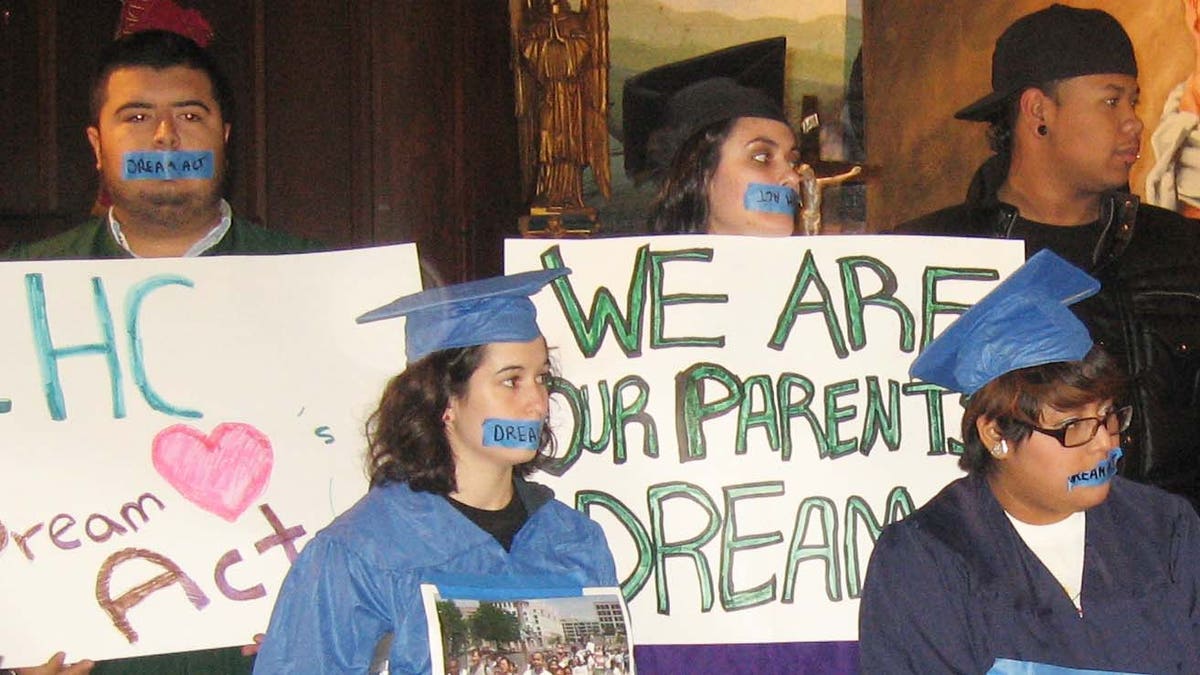
Undocumented students across the country are staging hunger strikes to press for the passage of the DREAM Act, a measure that would give them a shot at U.S. citizenship.
The House of Representatives has scheduled a vote on the bill for Monday, and the feeling on all sides of the issue is that – with Republicans taking control of the House in January – if the DREAM Act doesn’t pass in the lame-duck session, it will be a long time before it gets another shot.
“We’re giving up our health and body for the DREAM Act,” said Him Ranjit, a 19-year-old from Nepal who lives in Texas and is planning to participate in the hunger strike. “This is an urgent issue for us.”
The micro-biology engineering major and other undocumented students from around the country plan to converge on the capital after Thanksgiving, and contact congressional aides through e-mails and telephone calls. They plan to stage sit-ins and stay in the spotlight to crank up the pressure, they say. They want the country to pay attention to their cause, they say.
Undocumented students in other states will be holding their own press conferences, and acts of civil disobedience, in solidarity with those in Washington D.C. Major events are planned in Maine, and in Times Square through Monday.
Critics of the measure say that the DREAM Act is a form of amnesty, a reward for lawbreakers. They say U.S. citizens and legal immigrants should not have to subsidize the tuition of illegal immigrants, or support the bending of laws so they can find employment.
"This comes down to a bunch of students who want a discount on their tuition," said Steve Lonegan, a former mayor of a New Jersey town and a former candidate for the Republican nomination for New Jersey governor in 2005 and 2009. "Here's a path to legalization for them. They can go back to their country, get in line with everyone else, and wait their turn."
As mayor and GOP candidate, Lonegan made headlines with his calls for strict immigration policies.
“These are our lives,” said Karla Resendiz, an undocumented 24-year-old Mexican immigrant who just graduated with honors with a degree in pharmacy from the University of Texas, and who legally cannot work because of her status. “Since I graduated, advocating for the DREAM Act has been my full-time job.”
In Texas, which has taken a lead on the youth-driven DREAM Act movement, some 60 students are already into their 14th day of a hunger strike, said Resendiz, who is an officer of the DREAMACTIVIST, which describes itself as an “undocumented students action and resource network.”
“Many other people started yesterday, too,” said Resendiz, who is not a hunger striker, but is among a group that is monitoring the protesters’ health. “It’s about being frustrated that the DREAM Act and our situation wasn’t being addressed, and knowing that there was something we could do about it.”
The DREAM Act would provide a path to legalization for children who have lived in the United States for at least five years, came before the age of 16, and attend college or enlist in the military for at least two years. It would also allow students who lack legal status to attend college at in-state tuition rates, instead of out-of-state rates, which tend to be twice as high.
Texas is one of a few states that allow illegal immigrant students to attend college at in-state tuition rates. But Resendiz, who graduated from high school with a 4.5 grade point average and, now, in college, with a 3.6, says the employment doors are bolted shut for the undocumented who manage to get college degrees.
"I paid for my education through private scholarships, private loans, help from my parents," said Resendiz, who came from México at the age of 12, and quickly assimilated, becoming the captain of the fencing team and president of the Rotary Club at her high school, where she was one of only two Hispanics. "I don't know what I can do now, without papers, without a driver's license."
Several efforts to get the DREAM Act passed in Congress have failed, most recently in September, when Democrats tried to make the bill a part of the defense appropriations measure, drawing strong objections from Republicans.
Before that, much of the attention on immigration reform laws focused on a comprehensive approach, which included DREAM Act provisions, but also a host of other things aimed at giving all illegal immigrants who met certain criteria a path to citizenship.
Young illegal immigrants say they became increasingly frustrated by what they saw as the misguided effort of some legislators and lobby groups to try to gain support for legislation that was too sweeping. Many felt that the DREAM Act, by itself, stood a better chance of getting the support of people who would not support other aspects of an ambitious immigration bill.
"The bills had to go through several committees, then for a vote, and for a long time no bill had even been written," Resendiz said. "Our feeling was that we just couldn't wait until the [legislators who supported immigration reform] finally got the political power, or political guts, to address immigration."
Undocumented students held protests in Washington D.C. in the summer, and some were arrested.
"Some politicians asked us why were doing that," said Sonia Guinansaca, an undocumented student from Ecuador who was among those arrested at a protest in June. "But we decided we had to do this ourselves. We decided to come out and fight for the DREAM Act, saying in public that we were undocumented, and identifying ourselves, with first and last names."
But the students said they succeeded at getting the attention of lobby groups and legislators who said they supported the DREAM Act, but had not wanted to treat it as a stand-alone bill.
Now, the students say, they know they have a big fight on their hands.
Opponents of the DREAM Act also includes fellow youth, some of them legal immigrants, who say it is unfair to make accommodations for students who do not have legal status.
And they know they must also deal with what some see as the passive, unspoken resistance of some Democrats.
On Sunday, several students attended a DREAM Act speech at a Brooklyn church that featured Rep. Luís Gutiérrez, the Illinois Democrat who is a leading voice in the push for immigration reform. One student carried a sign that said: "Gutiérrez Doesn't Speak For Dreamers."
Last week, several students showed up at the Washington D.C. office of Sen. Robert Menéndez, D-N.J., to press for action on the DREAM Act.
The move angered many Democrats, who saw it as immature and ungrateful.
"He had just met with President Obama to talk about the DREAM Act," Gutiérrez said. "Why go to his office?
"As much as many people like to blame Republicans" for the DREAM Act and immigration reform not gaining traction, Guinansaca said, "we also have to hold Democrats accountable. They say they support these bills. We're holding them accountable, we want them to work on it. We don't need words, we need action."
Follow us on twitter.com/foxnewslatino
Like us at facebook.com/foxnewslatino












































